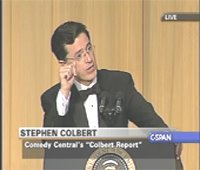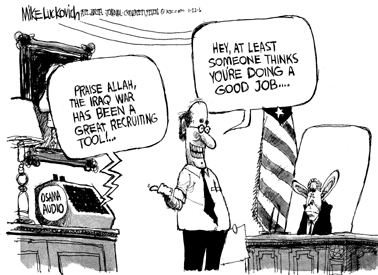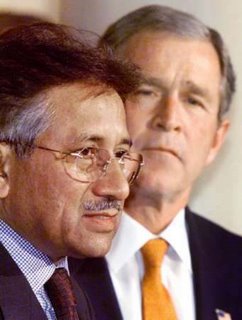
The report from Mohamed ElBaradei, chief of the International Atomic Energy Agency (IAEA), to the UN security council was entirely as expected given Iran's behaviour over the past few weeks, and it's intransigence over demands that it suspend all enrichment of uranium in it's nuclear process, which Iran insists is for peaceful purposes and not for the building of a nuclear bomb.
Likewise, was the escalation in American rhetoric not an unexpected development; with the US now branding Iran as one of the world's most active sponsors of terrorism.
So far, so predictable.
The real question is where do we go from here.
The Iranians, whose leadership is publicly defiant, informed Mr ElBaradei that it remained "fully committed" to its obligations under the nuclear non-proliferation treaty, and that it was co-operating with IAEA. But the letter said the timetable and continued access for inspectors to declared nuclear sites, were conditional on Iran's nuclear dossier staying with the IAEA, in an apparent attempt to avert security council action.
President George Bush, whose administration has been calling for sanctions against Iran and even hinted of possible military action to prevent Iran from obtaining a nuclear weapon, stressed that he was seeking a peaceful outcome. "It's very important for the Iranians to understand there is a common desire by a lot of nations in this world to convince them, peacefully convince them, that they ought to give up their weapons ambitions," he said.
Iran are hinting that they are willing to overcome international suspicions as long as matters remain in the hands of the IAEA. You'll notice that George Bush continues to refer to "weapons ambitions" that he has never proven that Iran possesses.
This is fast becoming an issue of national pride to both the Iranians and the US, which is what makes it all the more dangerous.
Iran has a right under the nuclear non-proliferation treaty to enrich uranium for the purposes of nuclear energy and it is becoming abundantly clear that the Iranians are not going to be persuaded to give up that right.
George Bush, by approaching the United Nations with his concerns, has made this an issue on which his reputation hangs with huge swathes of his domestic audience.
Ahmadinejad is not going to blink.
He remains, so far, entirely within his rights under the NNPT. And he remains emboldened as long as he feels sure he has Russian and Chinese backing in opposing any sanctions the UN may threaten to impose on his regime.
It is time for Bush to realise that he is rapidly approaching the brick wall that was always going to be the result of his rush to the UN. It is time for pragmatism.
Bush weakens his case by ignoring the fact that the Iranians are well within their rights to enrich uranium.
He needs to stress this Iranian right whilst insisting that the world needs to be reassured that Iran seeks to go no further and has no ambitions to build the bomb.
To achieve this end, he has made a very bad start. By assuming the very worst about Iranian intentions he has, perhaps unwittingly, reminded us all of his rash - and totally unfounded - suspicions about Iraq. Bush is not on solid ground.
If he really wants to bring the world onboard then he must work with the IAEA to find a way to validate or disprove the Iranian claims.
Threats of violence and assumptions of Iranian guilt won't wash here. Bush is the boy who cried wolf. The world won't fall for it a second time.
It is time for Bush, as much as it is time for Iran, to come back within the norms of international diplomacy.
If he does not, then disaster awaits him. He is playing a game of poker with a very, very bad hand.
Related Articles:Scathing nuclear report as US brands Iran enemy No 1Iran 'stepping up its nuclear programme' Tags:
Iran, UN, inspectors, inspections, crisis, US, war, uranium, nuclear weapons, ElBaradei, Bush, UN,
 Crooks and Liars have a wonderful video of Stephen Colbert doing his spoof TV Republican anchorman in front of Bush and the White House Correspondents Dinner.
Crooks and Liars have a wonderful video of Stephen Colbert doing his spoof TV Republican anchorman in front of Bush and the White House Correspondents Dinner.














































